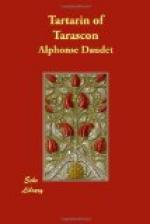With that the Captain returned to his absinthe and Tartarin pensively trotted his mule down the road to his little house. Although in his loyal heart he refused to believe any of the insinuations made by the Captain, they had upset him, and his rough oaths and country accent had combined to awake in him a vague feeling of remorse. When he reached home, Baia had gone to the baths, the negress seemed to him ugly, the house dismal, and prey to an indefinable melancholy, he went and sat by the fountain and filled his pipe with Barbassou’s tobacco. The tobacco had been wrapped in a fragment of paper torn from “The Semaphore” and when he spread it out the name of his home town caught his eye.
“News from Tarascon,” He read, “The town is in a state of alarm. Tartarin the lion killer, who went to hunt the big cats in Africa, has not been heard of for several months.... What has happened to our heroic compatriot? One dare hardly ask oneself, knowing as we do his ardent nature, his courage and love of adventure.... Has he, like so many others, been swallowed up in the desert sands, or has he perhaps fallen victim to the murderous teeth of those feline monsters, whose skins he promised to the municipality.... A terrible incertitude! However, some African merchants who came to the fair at Beaucaire, claim to have met, in the heart of the desert, a white man whose description corresponds with his and who was heading for Timbuctoo. May God preserve our Tartarin!”
When he read this, Tartarin blushed and trembled. All Tarascon rose before his eyes. The club. The hat hunters. The green armchair at Costecalde’s shop: and soaring above, like the extended wings of an eagle, the formidable moustache of the brave Commandant Bravida. Then to see himself squatting slothfully on his mat, while he was believed to be engaged in slaying lions, filled him with shame. Suddenly he leaped to his feet. “To the lions!... To the lions!” He cried, and hurrying to the dusty corner where lay idle his bivouac tent, his medicine chest, his preserved foods and his weapons, he dragged them into the middle of the courtyard. Tartarin-Sancho had just perished, only Tartarin-Quixote was left.
There was just time enough to inspect his equipment, to don his arms and accoutrements, to put on his big boots, to write a few lines to prince Gregory, confiding Baia to his care, to slip into an envelope some banknotes, wet with tears, and the intrepid Tarasconais was in a stage-coach, rolling down the road to Blidah, leaving the stupefied negress in his house, gazing at the turban, the slippers and all the muslim rig-out of Sidi Tart’ri, hanging discarded on the wall.
Chapter 24.
It was an ancient, old-fashioned stage-coach, upholstered in the old way in heavy blue cloth, very faded, and with enormous pom-poms, which after a few hours on the road dug uncomfortably into one’s back. Tartarin had an inside seat, where he installed himself as best he could, and where, instead of the musky scent of the great cats, he could savour the ripe perfume of the coach, compounded of a thousand odours of men, women, horses, leather, food and damp straw.




